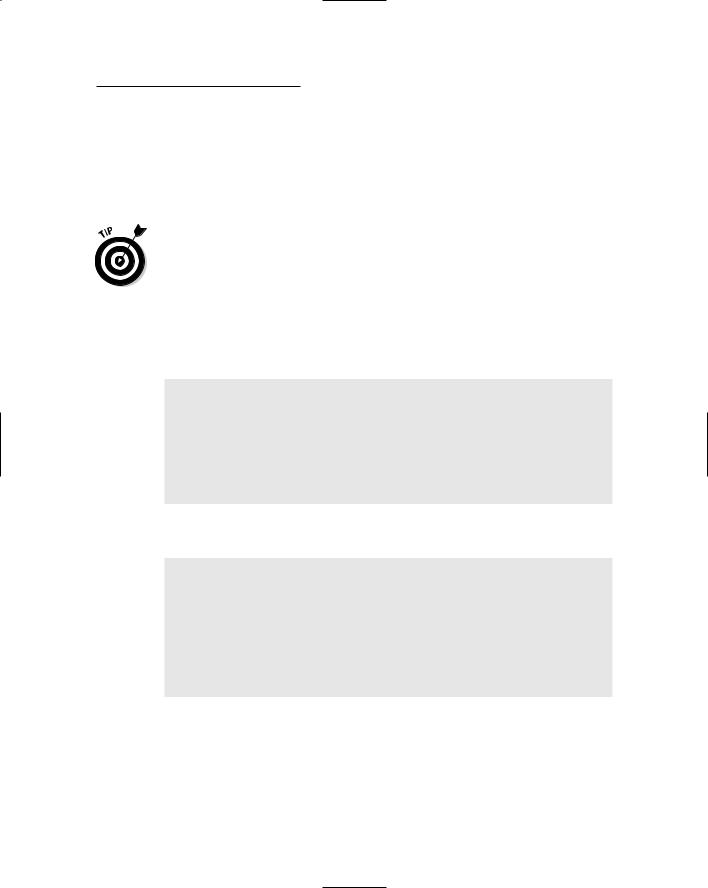
- •Table of Contents
- •Introduction
- •What Is C++?
- •Conventions Used in This Book
- •How This Book Is Organized
- •Part I: Introduction to C++ Programming
- •Part III: Introduction to Classes
- •Part IV: Inheritance
- •Part V: Optional Features
- •Part VI: The Part of Tens
- •Icons Used in This Book
- •Where to Go from Here
- •Grasping C++ Concepts
- •How do I program?
- •Installing Dev-C++
- •Setting the options
- •Creating Your First C++ Program
- •Entering the C++ code
- •Building your program
- •Executing Your Program
- •Dev-C++ is not Windows
- •Dev-C++ help
- •Reviewing the Annotated Program
- •Examining the framework for all C++ programs
- •Clarifying source code with comments
- •Basing programs on C++ statements
- •Writing declarations
- •Generating output
- •Calculating Expressions
- •Storing the results of expression
- •Declaring Variables
- •Declaring Different Types of Variables
- •Reviewing the limitations of integers in C++
- •Solving the truncation problem
- •Looking at the limits of floating-point numbers
- •Declaring Variable Types
- •Types of constants
- •Special characters
- •Are These Calculations Really Logical?
- •Mixed Mode Expressions
- •Performing Simple Binary Arithmetic
- •Decomposing Expressions
- •Determining the Order of Operations
- •Performing Unary Operations
- •Using Assignment Operators
- •Why Mess with Logical Operations?
- •Using the Simple Logical Operators
- •Storing logical values
- •Using logical int variables
- •Be careful performing logical operations on floating-point variables
- •Expressing Binary Numbers
- •The decimal number system
- •Other number systems
- •The binary number system
- •Performing Bitwise Logical Operations
- •The single bit operators
- •Using the bitwise operators
- •A simple test
- •Do something logical with logical calculations
- •Controlling Program Flow with the Branch Commands
- •Executing Loops in a Program
- •Looping while a condition is true
- •Using the for loop
- •Avoiding the dreaded infinite loop
- •Applying special loop controls
- •Nesting Control Commands
- •Switching to a Different Subject?
- •Writing and Using a Function
- •Divide and conquer
- •Understanding the Details of Functions
- •Understanding simple functions
- •Understanding functions with arguments
- •Overloading Function Names
- •Defining Function Prototypes
- •Variable Storage Types
- •Including Include Files
- •Considering the Need for Arrays
- •Using an array
- •Initializing an array
- •Accessing too far into an array
- •Using arrays
- •Defining and using arrays of arrays
- •Using Arrays of Characters
- •Creating an array of characters
- •Creating a string of characters
- •Manipulating Strings with Character
- •String-ing Along Variables
- •Variable Size
- •Address Operators
- •Using Pointer Variables
- •Comparing pointers and houses
- •Using different types of pointers
- •Passing Pointers to Functions
- •Passing by value
- •Passing pointer values
- •Passing by reference
- •Limiting scope
- •Examining the scope problem
- •Providing a solution using the heap
- •Defining Operations on Pointer Variables
- •Re-examining arrays in light of pointer variables
- •Applying operators to the address of an array
- •Expanding pointer operations to a string
- •Justifying pointer-based string manipulation
- •Applying operators to pointer types other than char
- •Contrasting a pointer with an array
- •Declaring and Using Arrays of Pointers
- •Utilizing arrays of character strings
- •Identifying Types of Errors
- •Choosing the WRITE Technique for the Problem
- •Catching bug #1
- •Catching bug #2
- •Calling for the Debugger
- •Defining the debugger
- •Finding commonalities among us
- •Running a test program
- •Single-stepping through a program
- •Abstracting Microwave Ovens
- •Preparing functional nachos
- •Preparing object-oriented nachos
- •Classifying Microwave Ovens
- •Why Classify?
- •Introducing the Class
- •The Format of a Class
- •Accessing the Members of a Class
- •Activating Our Objects
- •Simulating real-world objects
- •Why bother with member functions?
- •Adding a Member Function
- •Creating a member function
- •Naming class members
- •Calling a Member Function
- •Accessing a member function
- •Accessing other members from a member function
- •Defining a Member Function in the Class
- •Keeping a Member Function After Class
- •Overloading Member Functions
- •Defining Arrays of and Pointers to Simple Things
- •Declaring Arrays of Objects
- •Declaring Pointers to Objects
- •Dereferencing an object pointer
- •Pointing toward arrow pointers
- •Passing Objects to Functions
- •Calling a function with an object value
- •Calling a function with an object pointer
- •Calling a function by using the reference operator
- •Returning to the Heap
- •Comparing Pointers to References
- •Linking Up with Linked Lists
- •Performing other operations on a linked list
- •Hooking up with a LinkedListData program
- •A Ray of Hope: A List of Containers Linked to the C++ Library
- •Protecting Members
- •Why you need protected members
- •Discovering how protected members work
- •Protecting the internal state of the class
- •Using a class with a limited interface
- •Creating Objects
- •Using Constructors
- •Why you need constructors
- •Making constructors work
- •Dissecting a Destructor
- •Why you need the destructor
- •Working with destructors
- •Outfitting Constructors with Arguments
- •Justifying constructors
- •Using a constructor
- •Defaulting Default Constructors
- •Constructing Class Members
- •Constructing a complex data member
- •Constructing a constant data member
- •Constructing the Order of Construction
- •Local objects construct in order
- •Static objects construct only once
- •Global objects construct in no particular order
- •Members construct in the order in which they are declared
- •Destructors destruct in the reverse order of the constructors
- •Copying an Object
- •Why you need the copy constructor
- •Using the copy constructor
- •The Automatic Copy Constructor
- •Creating Shallow Copies versus Deep Copies
- •Avoiding temporaries, permanently
- •Defining a Static Member
- •Why you need static members
- •Using static members
- •Referencing static data members
- •Uses for static data members
- •Declaring Static Member Functions
- •What Is This About, Anyway?
- •Do I Need My Inheritance?
- •How Does a Class Inherit?
- •Using a subclass
- •Constructing a subclass
- •Destructing a subclass
- •Having a HAS_A Relationship
- •Why You Need Polymorphism
- •How Polymorphism Works
- •When Is a Virtual Function Not?
- •Considering Virtual Considerations
- •Factoring
- •Implementing Abstract Classes
- •Describing the abstract class concept
- •Making an honest class out of an abstract class
- •Passing abstract classes
- •Factoring C++ Source Code
- •Defining a namespace
- •Implementing Student
- •Implementing an application
- •Project file
- •Creating a project file under Dev-C++
- •Comparing Operators with Functions
- •Inserting a New Operator
- •Overloading the Assignment Operator
- •Protecting the Escape Hatch
- •How Stream I/O Works
- •The fstream Subclasses
- •Reading Directly from a Stream
- •Using the strstream Subclasses
- •Manipulating Manipulators
- •Justifying a New Error Mechanism?
- •Examining the Exception Mechanism
- •What Kinds of Things Can I Throw?
- •Adding Virtual Inheritance
- •Voicing a Contrary Opinion
- •Generalizing a Function into a Template
- •Template Classes
- •Do I Really Need Template Classes?
- •Tips for Using Templates
- •The string Container
- •The list Containers
- •Iterators
- •Using Maps
- •Enabling All Warnings and Error Messages
- •Insisting on Clean Compiles
- •Limiting the Visibility
- •Avoid Overloading Operators
- •Heap Handling
- •Using Exceptions to Handle Errors
- •Avoiding Multiple Inheritance
- •Customize Editor Settings to Your Taste
- •Highlight Matching Braces/Parentheses
- •Enable Exception Handling
- •Include Debugging Information (Sometimes)
- •Create a Project File
- •Customize the Help Menu
- •Reset Breakpoints after Editing the File
- •Avoid Illegal Filenames
- •Include #include Files in Your Project
- •Executing the Profiler
- •System Requirements
- •Using the CD with Microsoft Windows
- •Using the CD with Linux
- •Development tools
- •Program source code
- •Index

Chapter 9: Taking a Second Look at C++ Pointers 133
The expressions charArray[10] and *(charArray + 10) are equivalent and legal. The two expressions involving pArray are syntactically equivalent but don’t make sense. Although they are both legal to C++, the uninitialized pointer pArray contains a random value. pArray has not been initialized to point to an array such as charArray so both pArray[10] and the equivalent *(pArray + 10) reference garbage.
The mistake of referencing memory with an uninitialized pointer variable is gen erally caught by the CPU when the program executes, resulting in the dreaded segment violation error that from time to time issues from your favorite applica tions under your favorite, or not-so-favorite, operating system. This problem is not generally a problem of the processor or the operating system but of the application.
A second difference between a pointer and the address of an array is the fact that charArray is a constant, whereas pArray is not. Thus, the following for loop used to initialize the array charArray does not work:
void arrayVsPointer()
{
char charArray[10];
for (int i = 0; i < 10; i++)
{
*charArray = ‘\0’; |
// |
this makes sense... |
charArray++; |
// |
...this does not |
}
}
The expression charArray++ makes no more sense than 10++. The following version is correct:
void arrayVsPointer()
{
char charArray[10]; char* pArray = charArray;
for (int i = 0; i < 10; i++)
{
*pArray = ‘\0’; |
// this works great |
pArray++; |
|
}
}
Declaring and Using Arrays of Pointers
If pointers can point to arrays, it seems only fitting that the reverse should be true. Arrays of pointers are a type of array of particular interest.
Just as arrays may contain other data types, an array may contain pointers.
The following declares an array of pointers to ints:

134 Part II: Becoming a Functional C++ Programmer
int* pInts[10];
Given the preceding declaration, pnInt[0] is a pointer to an int value. Thus, the following is true:
void fn()
{
int n1;
int* pInts[3]; pInts[0] = &n1; *pInts[0] = 1;
}
or
void fn()
{
int n1, n2, n3;
int* pInts[3] = {&n1,&n2,&n3}; for (int i = 0; i < 3; i++)
{
*pInts[i] = 0;
}
}
or even
void fn()
{
int* pInts[3] = {(new int), (new int), (new int)};
for (int i = 0; i < 3; i++)
{
*pInts[i] = 0;
}
}
The latter declares three int objects off the heap.
This type of declaration isn’t used very often except in the case of an array of pointers to character strings. The following two examples show why arrays of character strings are useful.
Utilizing arrays of character strings
Suppose I need a function that returns the name of the month corresponding to an integer argument passed to it. For example, if the program is passed a 1, it returns a pointer to the string “January”; if 2, it reports “February”, and so on. The month 0 is assumed to be invalid as are any numbers greater than 12.

Chapter 9: Taking a Second Look at C++ Pointers 135
I could write the function as follows:
// int2month() - return the name of the month char* int2month(int nMonth)
{
char* pszReturnValue;
switch(nMonth)
{
case 1: pszReturnValue = “January”; break;
case 2: pszReturnValue = “February”; break;
case 3: pszReturnValue = “March”; break;
// ...and so forth...
default: pszReturnValue = “invalid”;
}
return pszReturnValue;
}
The switch() control command is like a sequence of if statements.
A more elegant solution uses the integer value for the month as an index into an array of pointers to the names of the months. In use, this appears as follows:
// int2month() - return the name of the month char* int2month(int nMonth)
{
//first check for a value out of range if (nMonth < 1 || nMonth > 12)
{
return “invalid”;
}
//nMonth is valid - return the name of the month char* pszMonths[] = {“invalid”,
“January”,
“February”,
“March”,
“April”,
“May”,
“June”,
“July”,
“August”,
“September”,
“October”,
“November”,
“December”}; return pszMonths[nMonth];
}

136 Part II: Becoming a Functional C++ Programmer
Here int2month() first checks to make sure that nMonth is a number between 1 and 12, inclusive (the default clause of the switch statement handled that in the previous example). If nMonth is valid, the function uses it as an offset into an array containing the names of the months.
This technique of referring to character strings by index is especially useful when writing your program to work in different languages. For example, a program may declare a ptrMonths of pointers to Julian months in different languages. The program would initialize ptrMonth to the proper names, be they in English, French or German (for example) at execution time. In that way, ptrMonth[1] points to the correct name of the first Julian month, irre spective of the language.
Accessing the arguments to main()
The first argument to main() is an array of pointers to null terminated char acter strings. These strings contain the arguments to the program. The argu ments to a program are the strings that appear with the program name when you launch it. These arguments are also known as parameters. For example, suppose that I entered the following command at the MS-DOS prompt:
MyProgram file.txt /w
MS-DOS executes the program contained in the file MyProgram.exe, passing it the arguments file.txt, and /w.
If you have never seen an MS-DOS prompt, please bear with me. There is an exact Windows analog that will appear here in just a second.
The variable pszArgs passed to main() is an array of pointers to the argu ments to the program, whereas nArg is the number of arguments.
Consider the following simple program:
//PrintArgs - write the arguments to the program
//to the standard output
#include <cstdio> #include <cstdlib> #include <iostream> using namespace std;
int main(int nNumberofArgs, char* pszArgs[])
{
// print a warning banner
cout << “The arguments to “ << pszArgs[0] << “are:\n”;
// now write out the remaining arguments for (int i = 1; i < nNumberofArgs; i++)

Chapter 9: Taking a Second Look at C++ Pointers 137
{
cout << i << “:” << pszArgs[i] << “\n”;
}
// that’s it
cout << “That’s it\n”;
//wait until user is ready before terminating program
//to allow the user to see the program results system(“PAUSE”);
return 0;
}
As always, the function main() accepts two arguments. The first argument is an int that I have been calling (quite descriptively, as it turns out) nNumberofArgs. This variable is the number of arguments passed to the pro gram. The second argument is an array of pointers of type char[]*, which I have been calling pszArgs. Each one of these char* elements points to an argument passed to the program.
Accessing program arguments DOS style
If I were to execute the PrintArgs program as
PrintArgs arg1 arg2 arg3 /w
from the command line of an MS-DOS window, nArgs would be 5 (one for each argument). The first argument is the name of the program. Thus, pszArgs[0] points to PrintArgs. The remaining elements in pszArgs point to the program arguments. The element pszArgs[1] points to arg1, and pszArgs[2] to arg2, for example. Because MS-DOS does not place any signif icance on /w, this string is also passed as an argument to be processed by the program.
Accessing program arguments Dev-C++ style
You can add arguments to your program when you execute it from Dev-C++ as well. Select Parameters under the Debug menu. Type whatever you like and then run the program by choosing Execute Run or pressing Ctrl+F10 as usual. The program output appears as it would from the DOS prompt.
Accessing program arguments Windows-style
Windows passes arguments as a means of communicating with your program as well. Try the following experiment. Build your program as you would nor mally. Find the executable file using Windows Explorer. For example, the PrintArgs program should appear as X:\CPP_Programs\Chap09\PrintArgs. exe. Now grab a file and drop it onto the filename (it doesn’t matter what file you choose because the program won’t hurt it anyway). Bam! The PrintArgs program starts right up, and the name of the file that you dropped on the pro gram appears.

138 Part II: Becoming a Functional C++ Programmer
Now try again, but drop several files at once. Select multiple file names by clicking several files while pressing the Ctrl key or by using the Shift key to select a group. The name of each file appears as output.
I dropped a few of the files that appear in my \Program Files\WinZip folder onto PrintsArgs as an example:
The arguments to C:\PrintArgs.exe 1:C:\Program Files\WinZip\WZINST.HLP 2:C:\Program Files\WinZip\WZCAB.DLL 3:C:\Program Files\WinZip\WZCAB3.DLL 4:C:\Program Files\WinZip\WZ32.DLL 5:C:\Program Files\WinZip\WZQKPICK.EXE 6:C:\Program Files\WinZip\WZQKSTRT.RTF That’s it
Press any key to continue . . .
Notice that the name of each file appears as a single argument, even though the file name may include spaces. Also note that Windows passes the full pathname of the file.
Using the drag-and-drop feature is an easy way to pass arguments to your program at startup.
